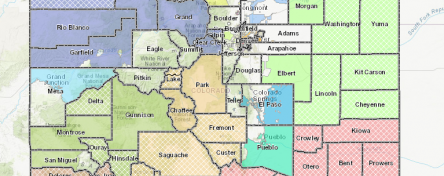Rewarding investment and innovation.
Colorado is a modified right-to-work state, with the most progressive labor law in the country. The Colorado Labor Peace Act requires two elections and approval from 75% of a company's workers before becoming unionized. Follow the link for more information on Colorado's unique labor law.
Colorado provides a competitive tax structure that rewards investments and business innovation. In 2005, Coloradoans voted to invest in Colorado’s future, without raising taxes. Referendum C allows the state to retain excess tax revenues and permits the state to spend those revenues on K-12 public education, healthcare, public higher education, and transportation projects.
Colorado Targeted Tax Incentives
Colorado offers various targeted tax incentive programs to companies creating new jobs and investment in the state:
- Job Growth Tax Incentive - The Job Growth Incentive Tax Credit is a performance-based job creation incentive program that provides a state income tax credit equal to 50% of the FICA paid by the business on the net job growth for each calendar year in the credit period.
- Aviation Development Zone Tax Credit - A business or any portion of a business that is involved in the maintenance and repair, completion or modification of aircraft located within the boundaries of an airport designated as an Aviation Development Zone may qualify for a state income tax credit of $1,200 per new full-time employee.
- Enterprise Zone Program - The Enterprise Zone Program provides tax credits for private enterprise to expand and for new businesses to locate in economically distressed areas of Colorado as designated by the Colorado Economic Development Commission (EDC). Businesses located in a zone may qualify for various Enterprise Zone Tax Credits and Incentives to encourage job creation and investment in Colorado.
- Advanced Industry Investment Tax Credit - Helps Colorado advanced industry companies receive capital from Colorado investors.
- Sales Tax Exemption on Components for Production of Energy from Renewable Energy Sources
Components used in the production of electricity from a renewable energy source are exempt from state sales and use tax. - Qualifying Therapeutic Discovery Projects - A tax credit provided under new section 48D of the Internal Revenue Code (IRC), enacted as part of the Patient Protection and Affordable Care Act of 2010 (P.L. 111-148). The credit is a tax benefit targeted to therapeutic discovery projects.
- Rural Jump-Start Tax Credit - Designed to assist businesses looking to start in or move to rural, economically distressed areas to hire new employees, this tax credit provides relief from state income taxes, state sales and use taxes, county personal property taxes, municipal personal property taxes and state income taxes for employees.
Local Property Tax Incentives
The Colorado Urban and Rural Enterprise Zone Act and House Bill 02-1399 enables local governments, at their discretion, to provide property tax credits or incentive payments (Business Incentive Agreements (BIA)) based on the amount of increased property taxes for qualifying new business activity in their jurisdictions.
Helpful links:
Metro Denver Incentives
Low taxes, a fair and accessible regulatory environment and low business costs foster Metro Denver’s favorable business climate. The state of Colorado and local governments in Metro Denver and Northern Colorado improve this climate by providing incentives that focus on:
- Job creation
- Employee training
- Tax rebates
- Expedited permitting and licensing
- Infrastructure improvements
Most of the incentives are granted on a case-by-case basis depending on the type of company, the number of employees, wages, and location of the project.
The state of Colorado provides performance-based incentive payments to qualifying companies that have created net new jobs that pay above average wages and also offers customized training grants.
Local governments offer sales and use tax rebates, personal property tax rebates, and expedited permitting and licensing programs as incentives. Some local governments also administer Enterprise Zones, providing incentives to businesses that expand or locate in designated economically distressed areas of the state.
Each local government’s incentives programs are based on the policies of the individual local jurisdiction. For questions or assistance with incentives, contact the Metro Denver EDC.






